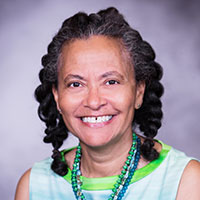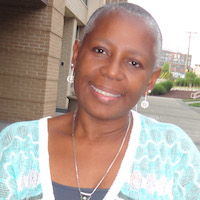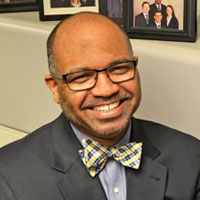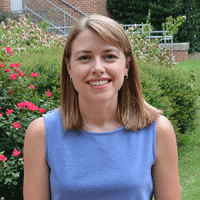Gillings School's 78th commencement celebrates the class of 2018
May 12, 2018
A story about a flippable “Open” and “Closed” restaurant sign and another about a gardener’s preference of red over pink flowers may seem innocuous enough on the surface, but they were offered as powerful allegories about systemic, institutionalized racism by the presenter of this year’s Commencement address for the graduates of the University of North Carolina’s Gillings School of Global Public Health.
The speaker, Camara Phyllis Jones, MD, PhD, past president of the American Public Health Association, recounted the first story as a “revelation” during her college days. She and some friends had gone to a restaurant late at night and, after they began eating, Jones’ eyes fell upon the sign in the window, which from her view, said “Open.” She knew, having seen such flippable signs so many times before, that everyone outside the restaurant saw the word “Closed.” The revelation came when she realized the sign was an allegory for racism.
“I recognized … how racism structures open and closed signs in our society,” she said. “How racism structures a dual reality. For those sitting inside the restaurant, at the table of opportunity, eating, they don’t even recognize that a two-sided reality is going on. That it’s difficult for any of us to recognize a system of inequity that privileges us. But for those on the other side of the sign, they are very well aware that there is a two-sided world going on because they can look through the window and see the other people.”
Jones added that when she spoke of racism she was not speaking about individuals.
“Let me define racism for you,” she said. “Because when I say the word, I’m talking about a system. I’m not talking about an individual character flaw or a personal or moral failing or even a psychiatric illness. I’m talking about a system of power.”
In the second story, Jones talked about a gardener with two flower boxes. One box held rich, fertile soil while the other held rocky, fallow soil. The gardener placed plants of equal quality in both boxes, but one had red blossoms, while the other yielded pink. The gardener preferred the red flowers, so she planted those seeds in the fertile box. The red flowers grew up straight and strong and produced tremendous blossoms, while the pink flowers struggled to grow and only produced a few short pink blooms. The gardener continued to give advantages to the red flowers over the pink, and even the pink flowers recognized the advantages held by the red flowers – so much so that they exhorted the honey bees to give them red flower pollen so they could enjoy some of the other flowers’ advantages.
Again, the allegorical allusion of the story was systemic, generational racism, a practice that could only be remedied by giving the pink seeds all the advantages of the red seeds – even to the point of perhaps having to change the gardener.
“Once you do know about racism, you can choose to act,” she said. “It’s not a scary thing to name racism; it’s an empowering thing.”
Jones also charged all in attendance to “be courageous, be unafraid of controversy and tell your truth.”
Her message was received warmly by the graduates, their friends and family members, and the Gillings School faculty members in attendance.
During the ceremony, more than 330 students were awarded degrees, with bachelor’s, master’s and doctoral graduates all well represented.
In her annual message to students, Dean Barbara K. Rimer, Alumni Distinguished Professor at the Gillings School, expressed personal pride in the graduates, and urged them to make the world and their communities safer, healthier and more just.
“You go forward into a world that holds many public health challenges, including scarcity of water, income and health inequality, infectious and noninfectious diseases, obesity and malnutrition, high cost of lifesaving medicines, the opioid epidemic, and too many people lacking quality health care,” Rimer said. “You can be effective community leaders, whatever your professional roles. Reaching out, beyond simplistic labels, to treat every person with dignity and respect, will enable you to become part of the solutions the world desperately needs. You can be on the cutting edge for civil society and use your knowledge and skills to make a better world.”
The commencement ceremony also included the presentation of three of the Gillings School’s most prestigious awards to three faculty members:
- Carmen Samuel Hodge, RD, PhD, assistant professor of nutrition, received the Harriet Hylton Barr Distinguished Alumni Award.
- Amanda Holliday, MS, RD, LDN, assistant professor of nutrition, received the Bernard G. Greenberg Alumni Endowment Award for Teaching, Research and Service.
- Jeffrey Simms, MSPH, MDiv, assistant professor of health policy and management, received the John E. Larsh Award for Mentorship.
More photos of the event can be found in our 2018 Gillings School Commencement Flickr Gallery.
Contact the Gillings School of Global Public Health communications team at sphcomm@listserv.unc.edu.





